Part 1 of 2
Dean Weaver, Teaching Elder in the Presbytery of the Alleghenies, is the Stated Clerk Search Committee’s nominee to succeed Jeff Jeremiah as EPC Stated Clerk. He serves as Lead Pastor of Memorial Park Presbyterian Church in Allison Park, Pa., and was Moderator of the EPC’s 37th General Assembly.
Weaver will be presented at the EPC’s 40th General Assembly for confirmation. In this wide-ranging interview, he talks about his walk with Christ and some of the challenges and victories from a life in ministry.
EPConnection: How did you come to the Lord?
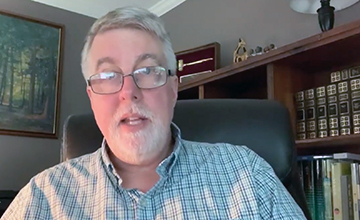 Dean: Although I grew up in the church, Christ brought me to Himself when I was 14 years old at summer camp. The guy who led me to Christ was a Young Life volunteer.
Dean: Although I grew up in the church, Christ brought me to Himself when I was 14 years old at summer camp. The guy who led me to Christ was a Young Life volunteer.
EPConnection: When did you realize you were called to ministry, and why as a pastor or leader?
Dean: I was called to the ministry my freshman year in college. I started college studying electrical engineering. One Sunday at church, the pastor preached a sermon that God used to call me into the ministry. It’s a long—but very cool—story.
EPConnection: Tell me about it.
Dean: Before I left home for Grove City College, the seminary intern from my home church literally grabbed me by both arms and said, “Dean, God often speaks through the voices of other people, and I am telling you He is speaking through me. You are called to the ministry! And you will be unhappy and miserable and find no peace until you submit to His call.”
So I went off to college with this echoing in my mind and soul, which was very disturbing. It wasn’t too long before I realized how much I hated physics, chemistry, and calculus—and was doing very poorly in my studies. I realized I was only studying electrical engineering because my guidance counselor had said that was where the good paying jobs were.
After about two and a half months of being miserable, I visited a friend one weekend at Indiana University of Pennsylvania, which is about 70 miles from Grove City. We went to Graystone Presbyterian Church (which is now EPC) for worship. The pastor began his sermon by saying, “I have never done this before, and I can’t believe I am doing this today, but I believe God spoke to me this morning and told me that someone would be here today, they would come from some distance, and they have been running away from God’s call in their life. They are unhappy, miserable, and will find no peace until they submit to God’s call. Whoever you are, this sermon is for you.”
After worship, I went up to the pastor to see if anyone had approached him to own up as the person he mentioned at the beginning of his message. When he said nobody had, I looked around the sanctuary and my friend and I were the only people left. I knew it was me. I told him that I was that person. He put his hands on my shoulder and said, “Young man, I don’t know who you are, but God has something very special in store for your life.” I went back to Grove City and on Monday morning changed my major to History/Religion (which is now called Biblical Studies) and began the long road of preparation for full-time pastoral ministry.
I have since come to refer to this as the “Dear Dean, … Love, God” sermon.
EPConnection: So how do you define “ministry”?
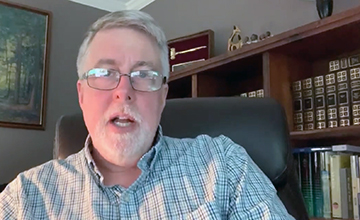 Dean: In the pursuit of Jesus, ministry happens. Ministry is what happens when a disciple of Jesus follows the Savior in every aspect and area of his or her life.
Dean: In the pursuit of Jesus, ministry happens. Ministry is what happens when a disciple of Jesus follows the Savior in every aspect and area of his or her life.
EPConnection: How do you define “leadership”?
Dean: Considering the needs of others more important than your own. Leadership is helping other people and organizations faithfully follow the Savior by using the gifts God has bestowed upon them with a full reliance of the Holy Spirt who dwells within them.
EPConnection: What Christian leaders/pastors do you read, listen to, or follow?
Dean: I read and follow all things Tim Keller (I am reading Uncommon Ground at the moment) and pay close attention to things that come out of The Gospel Coalition. I am also working through Jemar Tisby’s The Color of Compromise and appreciate anything from Max DePree or John Kotter when it comes to leadership. I also love the podcast “This Cultural Moment” with Mark Sayers and John Mark Comer.
EPConnection: Who is your favorite theologian?
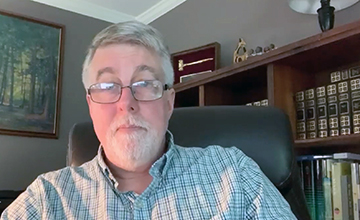 Dean: It might sound obvious, but Calvin is my favorite theologian from church history. Right now, I am reading and working to understand the differences between Abraham Kuyper and Herman Bavinck. I am currently reading Bavinck’s The Sacrifice of Praise.
Dean: It might sound obvious, but Calvin is my favorite theologian from church history. Right now, I am reading and working to understand the differences between Abraham Kuyper and Herman Bavinck. I am currently reading Bavinck’s The Sacrifice of Praise.
EPConnection: When did you realize the EPC was the best fit for you and your church?
Dean: I worked for renewal in the PC(USA) for years at every level of the denomination, which ultimately led me to help found and lead the New Wineskins Association of Churches (NWAC). I helped lead 180 congregations of the NWAC into the EPC, starting with my own congregation—Memorial Park—in 2006 through 2008. It was at my first EPC General Assembly that I realized that I was “home.” The sweet and generous spirit of biblical hospitality and family that characterized the EPC was what we had longed to be a part of for years.
EPConnection: How would you describe your God-given “hard wiring” and how it contributes to your strengths and weaknesses?
Dean: I am “hard-wired” to do the right thing. I can see what is needed or required to lead in all types of circumstances and will bring all my gifts, energy, and abilities to the situation with all my heart, soul, mind, and strength. As a visionary leader, I can help others pursue the future God is calling us to, but I can also be impatient about getting there.
EPConnection: How would you describe your personal devotional time?
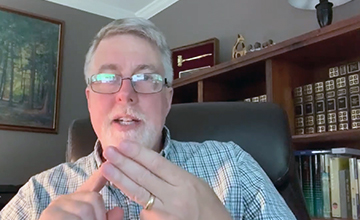 Dean: My conversation with the Lord is woven throughout the day. Typically, most days involve time in the Psalms, reading the chapter of Proverbs for that day of the month and spending the majority of my “devotional time” reflecting and praying over the preaching text for that week. Most days I also read Oswald Chambers’ My Utmost for His Highest and sometimes John Baillie’s A Dairy of Private Prayer.
Dean: My conversation with the Lord is woven throughout the day. Typically, most days involve time in the Psalms, reading the chapter of Proverbs for that day of the month and spending the majority of my “devotional time” reflecting and praying over the preaching text for that week. Most days I also read Oswald Chambers’ My Utmost for His Highest and sometimes John Baillie’s A Dairy of Private Prayer.
EPConnection: How do you balance the needs of your family (and yourself) in your ministry?
Dean: My kids range in age from 31 to 21 (I have seven kids and three grandkids). Three of our adult children are still living at home, and there is balance of time spent together with them and our other adult kids living nearby on a regular rhythm—especially gathering for family birthdays, holidays, and Steelers games! Beth and I spend good time together, both at home and with family and traveling. I don’t really think of it as a matter of “balance” but whole-life and healthy integration. We work, rest, and play. The key for us over the years, in terms of being healthy, is faithful practice of the Sabbath weekly and taking our vacation and study leave—and living into our love language of “quality time.”
EPConnection: What in ministry are you most passionate about?
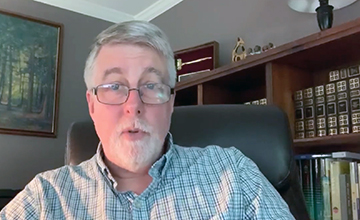 Dean: I’m passionate about helping churches exegete the culture and reach out with the gospel in their Jerusalem, Judea/Samaria, and the ends of the Earth—with a focus on reaching the fullness of all the ta ethne; that is, ethnicities within their spheres of influence.
Dean: I’m passionate about helping churches exegete the culture and reach out with the gospel in their Jerusalem, Judea/Samaria, and the ends of the Earth—with a focus on reaching the fullness of all the ta ethne; that is, ethnicities within their spheres of influence.
EPConnection: Can you recall a tragic situation that has directly (or perhaps indirectly) affected how you fulfill your calling?
Dean: Early in my ministry, an African-American pastor friend’s lovely wife was pulled over by the police on her way home from a fitness center with her girlfriends. She was cited for having “a taillight out.” She was taken into custody, and her car impounded—leaving her friends on the curb. And this was during the winter.
My friend called me in deep frustration, and I called an attorney from my congregation who intervened. In the pursuit of justice, I learned that this local municipality had a long history of targeting blacks who passed through their community with overly aggressive and hostile policing behavior. Seeing such injustice up close as experienced by a good and godly friend would influence my family, relationships, ministry, and my work toward biblical justice for people who are victimized because of the color of their skin and ethnicity.
EPConnection: When you have felt pushed beyond your capabilities as a leader, and how did you manage it?
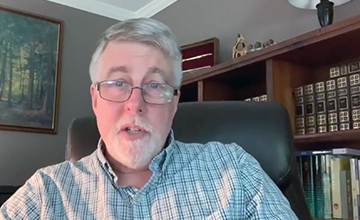 Dean: I can think of a number of times that has been the case. But the COVID-19 quarantine combination of closing church and migrating to digital ministry, as well as the tensions in our community, nation, and world around racial injustice—all happening as I transition out of 14-plus years as the Lead Pastor for Memorial Park, conclude my season as Interim Chaplain at Grove City College, and begin preparing to take on the new role within the EPC—has tested me as a leader like I have never been tested before.
Dean: I can think of a number of times that has been the case. But the COVID-19 quarantine combination of closing church and migrating to digital ministry, as well as the tensions in our community, nation, and world around racial injustice—all happening as I transition out of 14-plus years as the Lead Pastor for Memorial Park, conclude my season as Interim Chaplain at Grove City College, and begin preparing to take on the new role within the EPC—has tested me as a leader like I have never been tested before.
To endure and preserve in such times I have leaned into the Lord like never before, praying and in the Word. I’ve also been depending on friends and family for counsel, support, and encouragement—and being intentional about healthy habits like rest, eating well, and taking breaks from endless Zoom meetings. Knowing my limits, and knowing when to throttle back and step away, has been key!
EPConnection: What is your approach to reflecting Christ’s love to people who do not (and have said they will not) attend church?
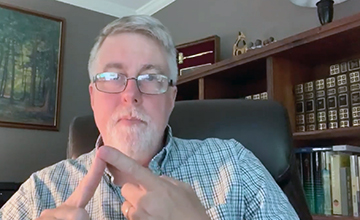 Dean: I find that I am more patient with people who have never been “church people” than those who were in the church and have fallen away. I have a very high ecclesiology. After all, the church is the Bride of Christ. Being a member of His body, joined with Him as one as John 17 describes, I can’t fathom being a follower of Jesus and not being joined to His body, the Church.
Dean: I find that I am more patient with people who have never been “church people” than those who were in the church and have fallen away. I have a very high ecclesiology. After all, the church is the Bride of Christ. Being a member of His body, joined with Him as one as John 17 describes, I can’t fathom being a follower of Jesus and not being joined to His body, the Church.
With those who did not grow up in the church, I listen, hear their concerns, and invite them to become a part of something much bigger and greater than themselves. I find that people have a strong need for community “hard-wired” into them, and the invitation to become part of the Body of Christ is an invitation to Christ Himself.
For those who have fallen away from the Church, I am patient and empathetic with those who have suffered trauma or abuse, but I can be impatient with those for whom “hypocrisy” has become a convenient excuse. Pastors need to be patient and comforting, but we also need to be persistent and prophetic. The word I have been reflecting on related to this tension is “contending.” As a pastor, I contend with people for the gospel and the fullness of its implications on all of their lives.
EPConnection: Do you have a go-to “God story” that you tell in order to encourage others?
Dean: How much time do you have?
EPConnection: As much as you need!
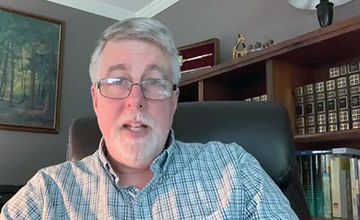 Dean: In 2002, I visited the West African nation of Sierra Leone for the first time. This was about three months after the official end of the 11-year civil war that had ravaged the country. “Blood diamonds” were involved and as many as 300,000 people were killed. Millions were displaced. It was horrendous. I went to help secure land and build an orphanage. To make a long story short, my wife, Beth, and I ended up adopting a brother and sister from that orphanage. We later helped start a ministry called EduNations that builds and operates what is now 16 schools, as well as planting six congregations of what has become the EPC-Sierra Leone.
Dean: In 2002, I visited the West African nation of Sierra Leone for the first time. This was about three months after the official end of the 11-year civil war that had ravaged the country. “Blood diamonds” were involved and as many as 300,000 people were killed. Millions were displaced. It was horrendous. I went to help secure land and build an orphanage. To make a long story short, my wife, Beth, and I ended up adopting a brother and sister from that orphanage. We later helped start a ministry called EduNations that builds and operates what is now 16 schools, as well as planting six congregations of what has become the EPC-Sierra Leone.
On my first trip “up-country” into the rural northern providences 16 years ago, I visited a graveyard of some of the first missionaries to Sierra Leone. Each time I return to Sierra Leone—especially with a team—we visit that graveyard. I tell my friends about the history of missions in that nation and that particular community where we have since built three schools and planted a church.
Last summer, Beth and I took our two Sierra Leonean children (now ages 21 and 25) back to their home village. We stopped at this missionary graveyard (as I always do) to tell them the history of the gospel work in Sierra Leone before going on to visit our schools in that community. It was then, after 16 years of visiting this graveyard, that I noticed the grave of Anna-Marie Stephens, a Wesleyan missionary who had died there in 1904. My heart raced with the possibilities because of the familiarity of that name. When I returned home, I dug deeply into my mother’s family history to confirm that Anna-Marie was my great grandfather’s first cousin!
Here’s the bottom line of this “God-story:” 115 years before I would ever set foot in the village of Maipinda or adopt our children, my cousin had given her life for the gospel and was buried in the very same village in Sierra Leone where I would later return to build Christian schools and plant churches among the Muslim peoples there. Long before I had children from Sierra Leone, my very blood was in the soil of Sierra Leone. If that is not the providence of God, I don’t know what is.
EPConnection: Thank you, Dean, for taking this time. In part 2 of this series, we will get to know Dean’s wife, Beth, and their family.
